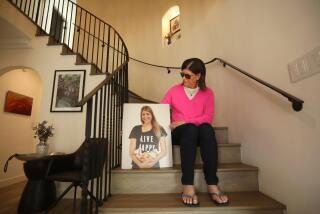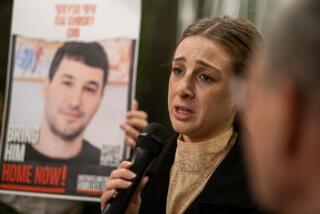In Remission, Shelley Ybarra Became a Mom, but Her Nemesis Has Returned : The Battle to Breathe
- Share via
RANCHO SANTA MARGARITA — Before she goes to sleep each night, Shelley Ybarra reaches for the oxygen tank beside her bed and inhales. Breathing with ease has become a luxury for her.
Ybarra, 30, of Rancho Santa Margarita suffers from Wegener’s granulomatosis, a rare tissue disease that has deteriorated more than 70% of her lungs. Like many incurable diseases, hers is volatile.
Yet, Ybarra bucked seemingly overwhelming odds to give birth in 1993 to a healthy boy, Austin. The following year, she had another son, Alex.
Doctors said they were surprised by the births because the toxic medications for Wegener’s can cause infertility. Ybarra is among a small group of Americans with Wegener’s who have successfully given birth, according to the National Institutes of Health.
After years in remission, Ybarra’s illness has flared since a severe case of the flu in January. Her health has worsened to the point that she has taken leave from her two hospital jobs. Ybarra is hoping that surgery this week will open up her airways and bring some relief.
“[Wegener’s] becomes a long, chronic fight for the victim,” said Dr. James Harrell, chief pulmonary specialist at UC San Diego, who has treated Ybarra. “She’s probably at an 8 now, 10 being the most horrible.”
Wegener’s, which is not hereditary, affects one in every 30,000 to 50,000 people, according to the National Organization for Rare Disorders. The disease is an autoimmune system disorder in which the body attacks its own tissues, causing inflammation and restricting blood flow.
Most Wegener’s patients suffer tissue inflammation in the respiratory tract. In Ybarra’s case, her right lung and most of her left have collapsed.
*
When she speaks, her words ride a flat wheeze humming from her throat. Between coughs, she inhales deeply. Her air passages have shrunk to the size of a pinhole, making every breath a painful struggle.
Ybarra said she sometimes relies on an electric wheelchair to go grocery shopping. The family recently moved to a ground-level apartment because she could not climb the one flight of stairs.
Despite her circumstances, Ybarra exudes a positive spirit.
“I don’t nap,” she said. “I feel if I’m sleeping or staying at home on my free time, I’m going to miss something that day. I feel bad if the day goes by and I can’t enjoy the fresh air. I feel this way because I don’t know how much time I have left.”
The disease has progressed so severely that the simple acts of putting on a sweater and lacing her shoes leave her gasping.
“I used to be very active,” said Ybarra, who would walk or roller-skate two to three miles each morning before her first child was born. “But now it’s hard to even walk 15 feet from the front door to get to the car.”
Ybarra’s illness was diagnosed as Wegener’s when she was 14. Too weak to attend school, she studied at home with tutors. She was too debilitated to go to the movies with friends or attend her high school prom.
Friends disappeared, said her mother, Linda Joye: “She was in her teenage years. Her whole life was shut down.”
After the disease went into remission when she was 17, she began to rebuild her life. She attended community college and made new friends, among them Peter Ybarra, whom she married. The couple had two “miracle babies,” sons Austin, now 2, and Alex, 19 months.
*
“Having the children were the most joyous moments in my life,” she said, beaming with hope in an interview after Alex was born. “Things can only get better with these two kids in the world.”
The new parents synchronized their work schedules so at least one of them could be with their sons. He worked early shifts and weekends as a merchandiser for a soft-drink company. At 3 p.m. she would head out to her night jobs at Hoag Memorial Hospital Presbyterian in Newport Beach and Saddleback Memorial Medical Center in Mission Viejo where she worked as a patient registrar.
Ybarra has been on leave from both jobs since early May. Co-workers at Saddleback Memorial launched a fund-raiser in April to help her with her mounting medical bills. About 150 hospital employees are donating money or vacation time that can be converted to dollars.
The donations will go to a trust fund set up by Ybarra’s father to help pay for this week’s surgery and her battery of doctor visits.
“We did this is because we want to try to take care of our family here at the hospital,” said Noland Draney, the hospital’s chief operations officer.
And Ybarra expresses concern about her own family, whether she will see her boys enter elementary school.
“I worry about leaving my kids,” she said in her soft voice. “I’m afraid they may not remember me. I’m not ready to die.”
More to Read
Sign up for Essential California
The most important California stories and recommendations in your inbox every morning.
You may occasionally receive promotional content from the Los Angeles Times.













